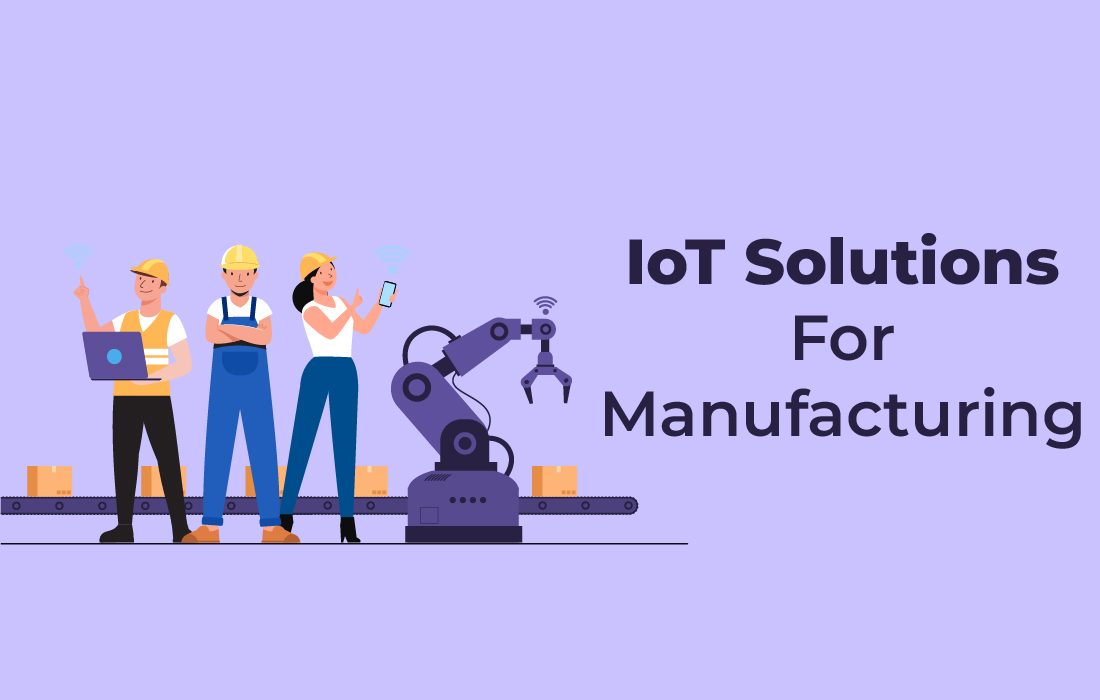Manufacturing industry is undergoing a global transformation referred to as the Fourth Industrial Revolution, or Industry 4.0. New technologies not only impacts the effectiveness of the manufacturing industry but also equips it with abilities to find smarter ways to work. Early adopters, such as interconnected factories and industrial organizations are already reaping the benefits of faster communication, visibility into manufacturing operations, increased capacity and many more. Industrial IoT solutions is such a ground-breaking technology which has a large impact on the manufacturing industry enabling business growth, process improvement and cost optimization.
Although there are a number of use cases for the Internet of Things with an ability to add IoT sensors and making the industry smarter, one can imagine just how many systems, equipment, and people can be connected to form a network which poses some challenges too. Challenges usually impact due to the lack of in-house technical resources to properly install an industrial IoT technology solution. Therefore having expert support from Sterison will be definitely handy.
Let’s take a look at some top use cases of using the Internet of Things in the manufacturing industry to understand where manufacturers are realizing success.
Remote Monitoring
Remote monitoring is a great use case for industrial assets out in the field with IoT-connected assets and IoT sensors on an industrial internet. Machine builders can monitor equipment usage and health in-order to assess performance and deploy service for any problems out there. Furthermore, the equipment data allows us to understand the performance of your equipment to improve product design to ensure customer satisfaction.
Supply Chain Management
IoT sensors ensure end-to-end control on the supply chain of manufacturing. For instance, manufacturers can monitor the movement of vehicles delivering supplies and goods, to access the detailed information on items in warehouses or to control inventory conditions such as temperature and humidity where products are stored or transported. This transparency in supply chain assists the industry managers greatly to develop and support seamless processes in enterprises.
Predictive Maintenance
Although there are several types of maintenance that manufacturers can employ at their facilities, deploying advanced forms of predictive maintenance based on data helps them in identifying possible abnormalities in the performance of equipment. Adoption of advanced IoT tools such as machine learning algorithms in digital factories learns from an IoT device to provide actionable insights. The data collected through this learning provides insight into the performance and health of equipment offering the maintenance teams to understand better on when the equipment needs to be serviced.
IoT-connected equipment enables the manufacturers to move from a calendar-based maintenance plan to a condition-based strategy. The data on equipment performance and health monitors the variables closely to establish a threshold to predict impending machine failure. This process of predictive maintenance or predictive repairing allows the technical service teams to detect issues and fix them before any serious equipment failure, thus reducing downtime and costs.
Digital Twins
The digital twin technology has emerged from combining Internet of Things, Artificial Intelligence (AI), Machine Learning (ML) and cloud computing. Digital twins are virtual or simulated copies of physical objects and their application of the manufacturing floor within a digital space. This is one of the interesting yet powerful use cases of industrial IoT, as it can even include a 3D representation of all of the physical assets, operational systems, and structures within a manufacturing facility. This greatly helps the manufacturers to test changes and simulate the impact without actually rolling out any physical changes.
Real-Time Machine Monitoring
Can you imagine a manufacturing technology giving operators and managers a gauge of how well machines are performing in real time? Adoption of the Internet of Things and its applications one can access all the data needed to fix problems faster and to meet the production schedules.
Real-time machine monitoring of wearable IoT provides a stream of data from the machine which is accurate and can be used for in-the-moment decision-making or in-depth analysis.
Production Visibility
Walking out onto the factory floor is an actual way for most manufacturers to know what’s happening on the factory. Even then, it takes more time to observe the operators and machines to understand where performance stands. This involves the manufacturer’s engagement with managers, analysing a whiteboard of part counts and so on.
But connecting IoT through a machine monitoring solution, manufacturing leaders, plant managers, and operators get insights about the machines on the manufacturing floor with visual dashboards tracking the performance against production goals.
Asset management
Most of the manufacturing enterprises look to implement asset practices which is made possible with IoT technology combined with the development of native web and mobile apps for iOS or Android. This in turn provides the manufacturers with real-time asset information to make reasonable decisions.
The major task of asset management lies in discovering and overseeing crucial assets such as components of the supply chain like raw materials, containers, and finished goods. This application of IoT ensures to drastically optimize logistics, maintain stocks of work in progress, and disclose thefts and violations. This also helps the producers calculate the usage of movable equipment elements, to initiate measures on shortening idle period and to enhance utilization.
Fleet Management
Managing the automotive fleet through IoT-driven devices helps the manufacturing industries to eliminate the risks concerning the costs related to vehicles, staff and transportation. Automatic fleet management solutions contribute to the greater efficiency of the company, as logistics managers can make good use of leveraging IoT when it comes to repairs and fuel expenditures. This optimizes all the tasks which cover monitoring fuel costs, smart deliveries, diagnostics, and drivers. Moreover, a real-time overlook of driver and vehicle performance assists to raise technicians’ safety, bring down inventory damage and reduce insurance payments.
Implementing IoT solutions in manufacturing industries requires solid expertise in this field. This makes Sterison Technology Private Limited a perfect option for companies eager to tap into IoT competitive advantages. We are here to help you, just call us or read more about our IoT services.






